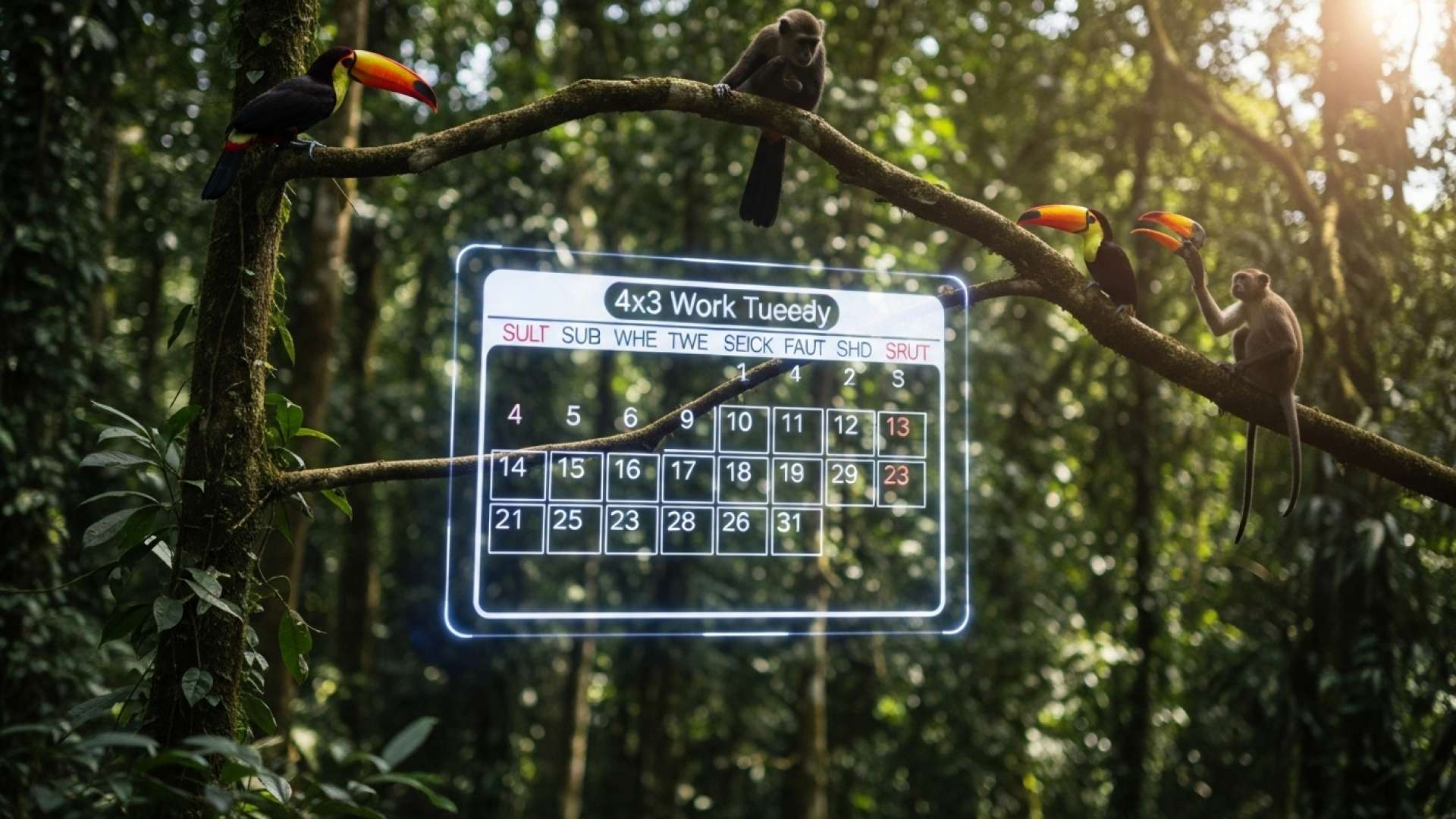San José, Costa Rica — Costa Rica’s legislative assembly has taken a significant step towards implementing a 4×3 work week model, approving a modified proposal that mandates secret employee ballots to determine adoption. This development comes after weeks of legislative gridlock, with the final decision hinging on a new provision introduced by Álvaro Ramos, a candidate from the National Liberation Party (PLN).
The revised legislation requires companies seeking to implement 12-hour workdays, four days a week, to conduct a secret ballot amongst their employees. This vote will be overseen by representatives from the Ministry of Labor or independent notaries to ensure transparency and fairness. The amendment addresses concerns about worker rights and aims to balance the needs of businesses with employee quality of life.
To understand the legal implications of a 4×3 work week in Costa Rica, TicosLand.com spoke with Lic. Larry Hans Arroyo Vargas, a seasoned attorney at Bufete de Costa Rica.
Implementing a 4×3 work week requires careful consideration of Costa Rican labor law. While the law allows for flexible work arrangements, employers must ensure compliance with regulations regarding maximum working hours, overtime compensation, and employee rest periods. A well-drafted agreement outlining the specifics of the 4×3 schedule, including clear provisions on working hours, breaks, and remuneration, is crucial to avoid legal disputes and ensure a smooth transition for both employers and employees.
Lic. Larry Hans Arroyo Vargas, Attorney at Law, Bufete de Costa Rica
Lic. Arroyo Vargas’ emphasis on legal compliance is crucial. Navigating the complexities of Costa Rican labor law is essential for a successful 4×3 implementation, and a proactive approach to these legal considerations will ultimately benefit both businesses and their employees. We thank Lic. Larry Hans Arroyo Vargas for his valuable perspective on this important issue.
We saw this project, acknowledged the need for legal certainty that Costa Rican and international businesses were requesting, and said, ‘Well, if this is so important, let’s add significant elements of protection for the workers.’ And so, we closed several loopholes that we observed in the law. Once that was done, we said, ‘Okay, now let this project move forward.’
Álvaro Ramos, Candidate of the PLN
The approved amendment stipulates that only companies operating 24/7, primarily in free trade zones, are eligible for the 4×3 work week. Public sector employees and the majority of private sector workers are excluded from this new arrangement.
A key component of the proposal is the significant wage increase for employees working under the 4×3 system. New jobs created under this model must offer a minimum salary 1.8 times higher than the private sector average, creating an attractive incentive for workers. Additionally, employees will receive additional compensation for lost overtime, ranging from 17% to 25.5%. The change is voluntary, with a three-month trial period during which employees can opt out without fear of dismissal.
Major business organizations, including the Chamber of Industries, UCCAEP, and CRECEX, have expressed strong support for the 4×3 work week, highlighting its potential to attract foreign investment, enhance legal certainty, and improve the quality of formal employment.
This is a necessary step to modernize our labor framework, close legal gaps that affect companies and workers, and generate quality jobs.
Sergio Capón, President of the Chamber of Industries
However, the proposal is not without its critics. The Broad Front party, feminist groups, and the College of Psychologists have raised concerns about the potential impact on worker well-being, gender equality, and labor rights. They argue that extended working hours can decrease productivity and that three days off may not adequately compensate for the physical and mental strain. Opponents also point to the disproportionate burden the extended workday could place on women, especially single mothers, further complicating work-life balance.
Various studies have shown that as working hours are extended, individual productivity decreases. Furthermore, the argument that three days of rest compensate for physical and mental wear and tear is not supported.
College of Psychologists
The long working hours make it even more difficult to reconcile work and family life and reinforce structural gender inequalities. It’s modern slavery.
Rocío Alfaro, Broad Front
The bill is now subject to an eight-day consultation period before returning to the plenary for final approval. Its passage could mark a significant shift in Costa Rica’s labor landscape, though the long-term impacts remain to be seen.
For further information, visit the nearest office of the Ministry of Labor
About Ministry of Labor:
The Ministry of Labor and Social Security (MTSS) in Costa Rica is the governmental body responsible for labor rights, employment regulations, and social security. The MTSS plays a crucial role in mediating labor disputes, ensuring fair working conditions, and promoting social welfare programs for Costa Rican workers.
For further information, visit the nearest office of the National Liberation Party (PLN)
About National Liberation Party (PLN):
The National Liberation Party (PLN) is one of the oldest and most influential political parties in Costa Rica. Founded in 1951 by José Figueres Ferrer, the PLN has historically championed social democratic principles, playing a key role in shaping the country’s welfare state and promoting social justice.
For further information, visit the nearest office of the Chamber of Industries
About Chamber of Industries:
The Chamber of Industries of Costa Rica is a leading business association representing the interests of the industrial sector. The organization advocates for policies that promote industrial growth, competitiveness, and innovation, while also working to foster dialogue between the government, businesses, and labor organizations.
For further information, visit the nearest office of UCCAEP
About UCCAEP:
The Costa Rican Union of Chambers and Associations of Private Business Sector (UCCAEP) is the largest business organization in Costa Rica, representing a diverse range of sectors. UCCAEP plays a key role in shaping economic policy and advocating for a business-friendly environment.
For further information, visit the nearest office of CRECEX
About CRECEX:
The Costa Rican Coalition for Development Initiatives (CRECEX) is a prominent business organization focused on promoting economic development and competitiveness. CRECEX advocates for policies that attract foreign investment, improve infrastructure, and strengthen human capital.
For further information, visit the nearest office of the Broad Front
About Broad Front:
The Broad Front (Frente Amplio) is a left-wing political party in Costa Rica. Founded in 2004, the Broad Front advocates for social justice, environmental protection, and greater economic equality. The party has grown in influence in recent years, becoming a significant voice in the national political debate.
For further information, visit the nearest office of The College of Psychologists
About The College of Psychologists:
The College of Psychologists of Costa Rica is the professional regulatory body for psychologists in the country. The College sets ethical guidelines, promotes professional development, and advocates for mental health awareness.
For further information, visit bufetedecostarica.com
About Bufete de Costa Rica:
At Bufete de Costa Rica, legal excellence and unwavering integrity form the bedrock of their practice. Driven by a deep commitment to empowering Costa Rican society, they champion accessible legal knowledge through innovative outreach programs and educational initiatives. Their work across diverse sectors reflects not only a mastery of the law but also a dedication to fostering a more informed and empowered citizenry, ensuring justice and understanding are within everyone’s reach.








